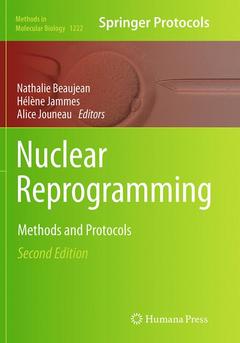Description
Nuclear Reprogramming (2nd Ed., 2nd ed. 2015)
Methods and Protocols
Methods in Molecular Biology Series, Vol. 1222
Coordinators: Beaujean Nathalie, Jammes Hélène, Jouneau Alice
Language: English
Subjects for Nuclear Reprogramming:
Support: Print on demand
Publication date: 10-2014
285 p. · 17.8x25.4 cm · Hardback
Description
/li>Contents
/li>Comment
/li>
Nuclear Reprogramming: Methods and Protocols, Second Edition includes not only classic methods to perform nuclear transfer in different species but also several techniques to assess the early and late development of the reconstructed embryos, at the cellular, molecular, and epigenetic level. Over the past several years, many technical improvements have been made to improve somatic cell nuclear transfer (SCNT) efficiency, all of which are reflected in the detailed chapters of this fully revised collection. Written in the highly successful Methods in Molecular Biology series format, chapters include introductions to their respective topics, lists of the necessary materials and reagents, step-by-step, readily reproducible laboratory protocols, and tips on troubleshooting and avoiding known pitfalls.
Authoritative and up-to-date, Nuclear Reprogramming: Methods and Protocols, Second Edition will be of interest not only to cloners but also to researchers concerned with studying the development of embryos.Nuclear Transfer in the Mouse.- Nuclear Transfer in the Rabbit.- Nuclear Transfer in Ruminants.- Nuclear Transfer and Transgenesis in the Pig.- Embryonic Stem Cell-Somatic Cell Fusion and Post-Fusion Enucleation.- Analysis of Nuclear Reprogramming Following Nuclear Transfer to Xenopus Oocyte.- Assessing the Quality of Donor Cells: Karyotyping Methods.- Treatment of Donor Cell/Embryo with Different Approaches to Improve Development After Nuclear Transfer.- Fluorescent Immunodetection of Epigenetic Modifications on Pre-Implantation Mouse Embryos.- Visualization of Epigenetic Modifications in Preimplantation Embryos.- Live Embryo Imaging to Follow Cell Cycle and Chromosomes Stability After Nuclear Transfer.- Analysis of Nucleolar Morphology and Protein Localization as an Indicator of Nuclear Reprogramming.- Assessment of Cell Lineages and Cell Death in Blastocysts by Immunostaining.- Gene Expression Analysis in Early Embryos through Reverse Transcription Quantitative PCR (RT-qPCR).- Studying Bovine Early Embryo Transcriptome by Microarray.- Methylation of Specific Regions: Bisulfite-Sequencing at the Single Oocyte or 2-Cell Embryo Level.- Micro Chromatin Immunoprecipitation (ChIP) from Early Mammalian Embryos.- Assessing Reprogramming by Chimera Formation and Tetraploid Complementation.- Whole-Mount In Situ Hybridization to Assess Advancement of Development and Embryo Morphology.- Genome-Wide Analysis of Methylation in Bovine Clones by Methylated DNA Immunoprecipitation (MeDIP).




